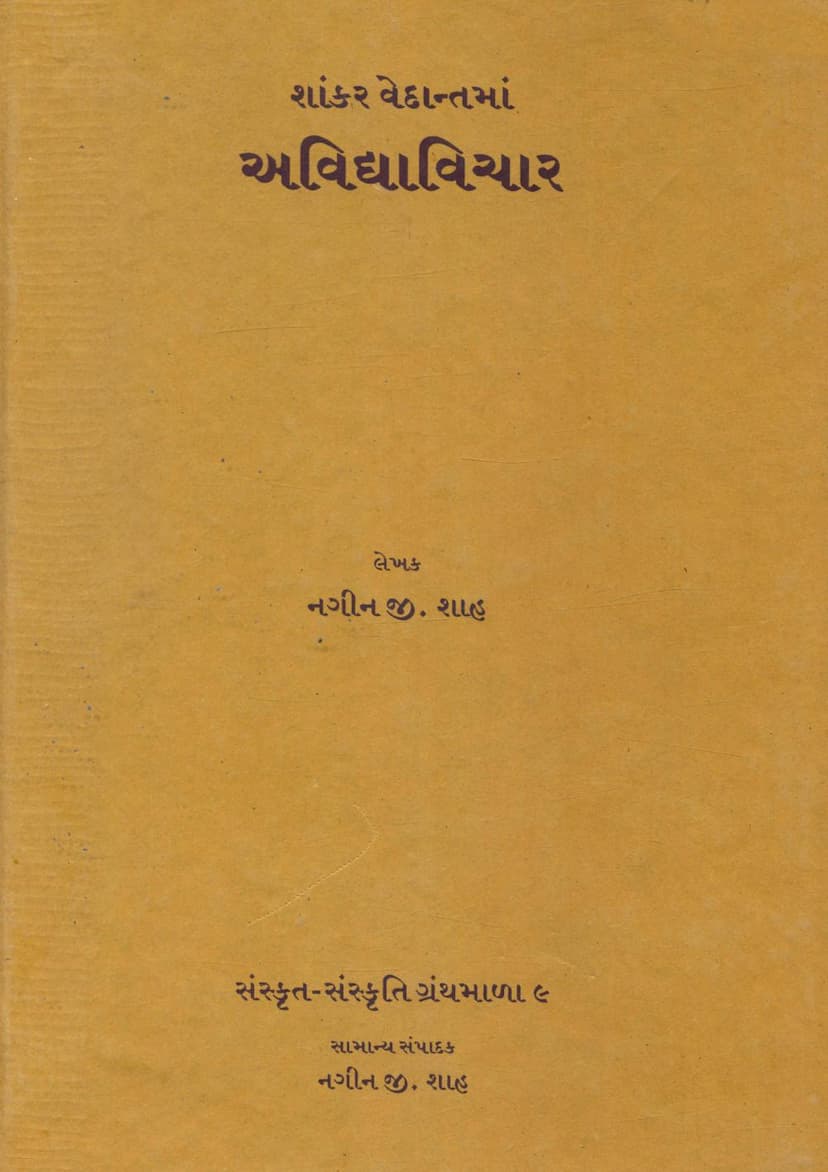Avidyavichar
Added to library: September 1, 2025

Summary
The book "Avidyavichar in Shankar Vedanta" (શાંકર વેદાન્તમાં અવિદ્યાવિચાર) by Nagin J. Shah, published by Sanskrit Sanskriti Granthmala, is a detailed exploration of the concept of Avidyā (ignorance or nescience) within the Advaita Vedanta philosophy, particularly as expounded by Adi Shankaracharya.
Here's a comprehensive summary of the text based on the provided pages:
Core Theme: The book aims to elucidate the nature and function of Avidyā, which is considered a foundational principle of Shankaracharya's Advaita Vedanta. Understanding Avidyā is presented as crucial for comprehending the profound mysteries of Advaita Vedanta.
Central Argument:
- Avidyā as the Cornerstone: The author emphasizes that the doctrine of Avidyā is the bedrock upon which the entire edifice of Advaita Vedanta is built. It is the lifeblood of this philosophy.
- Nature of Avidyā: The book delves into defining Avidyā, explaining its characteristics and its role in the philosophical system. It's described as mithyā ajñāna (false ignorance), which is the upādāna (material cause) of adhyāsa (superimposition or misattribution).
- Unspeakable Nature: Avidyā is characterized as anirvacanīya (indescribable or indefinable) and jaḍa (inert). It is neither existent (bhava) nor non-existent (abhava), nor is it both or neither. This indescribable nature is central to understanding its role in creating the illusory world.
- Multiple Names for Avidyā: The text notes that Avidyā is referred to by various names across scriptures and philosophical traditions, including Māyā, Prakṛti, Agrahana, Avyakta, Tamas, Kāraṇa, Laya, Śakti, Mahāsupti, Nidrā, Kṣara, Ākāśa, and others. Each name highlights a specific aspect of its nature or function.
- Purpose of the Book: To provide a detailed exposition of Avidyā's form and function, thereby illuminating the deeper secrets of Advaita Vedanta.
Methodology and Content:
- Rejection of Prāgabhāva: A significant portion of the book is dedicated to refuting the concept of Prāgabhāva (antecedent non-existence) as understood by schools like Nyaya-Vaisheshika. The author argues that Prāgabhāva cannot be equated with Avidyā, as Avidyā is considered eternal and the cause of the empirical world, while Prāgabhāva is contingent and related to specific beginnings. The refutation is elaborate, engaging with the arguments of scholars like Jayatīrtha and Vyāsatīrtha from the Dvaita tradition.
- Analysis of Definitions: The book meticulously examines the various definitions of Avidyā proposed in Advaita Vedanta, particularly those presented by Vyāsatīrtha in his Nyāyāmṛta, and defends them against criticisms. These definitions include:
- That which is beginningless (anādi), positive (bhāva), and is removed by knowledge (jñānanivartya).
- That which is the material cause of illusion (bhrama).
- That which is removable by knowledge (jñānanivartya).
- Critique of Opposing Views: The author engages with the critiques of Advaita Vedanta's concept of Avidyā, particularly from the Dvaita perspective (represented by Jayatīrtha and Vyāsatīrtha). The book systematically addresses arguments concerning Avidyā's nature (whether it's real or unreal), its relation to Brahman, and the possibility of its removal by knowledge.
- Emphasis on Logic and Reasoning: The author highlights the rigorous logical framework of Advaita Vedanta, particularly in its engagement with the sophisticated analytical methods of Navya Nyāya (New Nyāya). This demonstrates that Advaita is not anti-reason but rather deeply rooted in logical inquiry.
- Comparison with Other Indian Philosophies: The introduction and various sections also contextualize Advaita Vedanta within the broader landscape of Indian philosophy, mentioning its reception in the West through the works of scholars like Anquetil Duperron, Schopenhauer, and ultimately its influence on Western philosophical thought (Hegel, Schelling). The book also touches upon the relationship between Advaita Vedanta and other Indian philosophical systems like Jainism, Buddhism, Sāṁkhya, Yoga, Nyāya, and Vaiśeṣika.
Key Arguments and Counter-arguments (as seen in the detailed footnotes): The detailed footnotes indicate extensive engagement with criticisms, particularly from Nyaya scholars like Jayatīrtha and Vyāsatīrtha. These discussions revolve around:
- Avidyā's Causality: How Avidyā, being indescribable, can be the cause of the world.
- Avidyā's Beginninglessness (Anādi): How something beginningless can be removed by knowledge.
- Avidyā's Relationship with Brahman: The nature of their interdependence or lack thereof.
- The Role of Testimony (Śruti/Āgama): How scriptural authority supports Advaita's views against logical objections.
- The Problem of Error: How Avidyā explains the perception of multiplicity in a non-dual reality.
- The Nature of the Self (Ātman): Its relationship with Avidyā and liberation.
- The Concept of Prāgabhāva: The detailed refutation of Prāgabhāva as a valid concept in the Advaita framework, particularly in relation to Avidyā.
- The Analysis of Consciousness and Ignorance: The intricate points about how consciousness relates to ignorance and its removal.
Structure and Style: The book is structured to systematically analyze the concept of Avidyā, presenting the definitions, the critiques from opposing schools, and the Advaita refutations. The detailed footnotes suggest a scholarly approach, engaging with primary sources and secondary literature from both Advaita and Dvaita traditions. The author acknowledges that the dense logical analysis, particularly drawing from Navya Nyāya, makes the book substantial.
Author's Contribution: Nagin J. Shah, the author and general editor of the Sanskrit Sanskriti Granthmala series, expresses his satisfaction in contributing to the study of Indian philosophy in Gujarati. He notes that while he has written on other Indian philosophies, Vedanta, especially Shankaracharya's Advaita Vedanta, was a significant area he wished to cover. He chose Avidyā as the focal point due to its paramount importance in understanding Advaita. He also mentions his attempt to get a formal invitation from the Gujarat State Sanskrit Academy, which did not materialize, but he proceeded with his plan under his own series.
In essence, "Avidyavichar in Shankar Vedanta" is a scholarly treatise that meticulously dissects the multifaceted concept of Avidyā in Advaita Vedanta, engaging rigorously with philosophical debates and offering detailed explanations and defenses of the Advaita position.